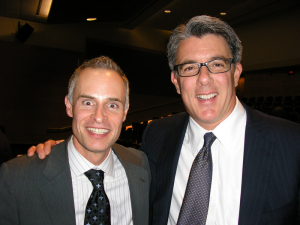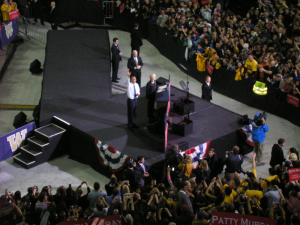Four times in one week I have heard the same story in different contexts. I am struck by the profundity of this problem, it being that there exists evidence that funding social wellness programs for children is both the simplest and most effective way to improve individual and societal health, and yet in America and elsewhere our child development programs are below capacity in both design and enrollment. The program which I heard referenced so much is Head Start.
For lots of reasons, children who enroll in pre-kindergarten tend to have better lives than children who do not. Some of the benefits which appear as trends in large populations of adults whose parents put them at age 4 into preliminary school include good health, better education, more social skills, better jobs, and other desirable things; these things are less common among populations whose parents did not put them into pre-k. There are lots of ways this could be considered; perhaps parents who put their children into pre-k are more engaged in their children’s development, or perhaps the act of enrolling them in pre-k when it is optional encourages them to be engaged throughout the child’s life when perhaps otherwise they might not have been. The way I think about this is to think that the act of committing to an arbitrary program for child improvement at least connects parents to social resources and makes them think about using community resources when perhaps they had not before and might not have otherwise.
On Friday October 15 I helped Ian manage the SPARX banquet. SPARX is the University of Washington service learning project for medical students interested in rural health. One might say that there are parallels between so-called “global health” and so-called “rural health”: global health refers to programs which push interventions to improve the health of societies in foreign and usually developing countries, whereas rural health refers to programs which push interventions to underserved populations in one’s own country. Both global health and rural health are relatively new ideas and becoming trendy as of the past few years; I just know that UW has begun funding these programs multiplicatively more lately but I do not have numbers. Other schools worldwide are also taking this interest.
Ian is the director of this program at the UW. One of the programs he supports is Headstart, which is a program to encourage parents to send their kids to pre-school, so that is the headline story in that context. But the banquet was logistically interesting, and since I have been to so many non-profit events which bombed I want to describe this very effective one so that everyone can know of this one way to make things work.
Ian got a ton of awesome catered food and had free cheap alcohol. This got people to attend, made them happy, and put them in a talkative mood. I am a strong supporter of using food to direct people’s behaviors. He arranged the banquet room so that table seated 12 persons. People gave short presentations, then Ian initiated an leadership action which stabbed every attendee right in the chest. This is what killed them – he had program directors for a lot of non-profit organizations ready to give short pitches about their orgs and an appeal for the students to join them. The program directors where themselves usually students engaged with the organization, so they were peers to those to whom they were targeting. With the students fed, with spirits high, with everyone at small tables, with a peer recruiter coming to them, with the programs being relevant to the students’ interests, with information about the programs being pushed at them in a favorable setting, and with the huge promise of favorable social and personal benefits to joining the programs, I am sure that all able recruiters got a good response from their request for people to join their organizations. But the clever part about this is that no one got to finish their conversations – there were lots of presenters there, and they went to each table for 10 minutes, then Ian rung a bell, and presenters changed tables.
The banquet was loud. It would never be possible to have this kind of intercourse at a typical conference where people meet in discussion rooms or at a fair where attendees approach people in booths or even at a typical banquet where a few speakers take the podium and invite an entire room at once. The physical proximity of the organization recruiters was a brutal tactic; I even expect that many people left that banquet thinking that it was their own idea to do rural health service learning when in fact I am sure only the slightest fraction would have signed up had they not been asked in this effective way.
I want to list the names of the organizations recruiting so that I will have a record of what was hot in Seattle at this time and place:
- Alliance for Equal Representation in Medicine
- Al Shifa
- American Medical Student Association
- Asian Pacific American Medical Student Association
- CHAP Community Health Advancement Program
- dermatology
- foot care
- orion health
- interagency tutoring
- perinatal care
- bilingual education
- adolescent sports medicine
- family medicine
- health equity circle
- IHI open school ??
- Latino Medical Student Association
- medicine wheel society
- Q Med
- rotaract club
- SITC students in the community – aloha inn wellness clinic
- education transforming community health
- SPARX
- Latina Health fair
- one night count of homeless
- teen feed breakfasts at roots
- medical respite for homeless youth
- student national medical association
- student physicians for social responsibility
On Tuesday October 19 I went to the food lecture by Marion Nestle and I already blogged that. She also talked about Head Start but it did not strike me at that time.
On Wednesday October 20 I went to a lecture on Obama’s new healthcare law advertising Scott Armstrong, the CEO of Group Health, as the speaker. UW’s lectures always have a lot of people in attendance and this one had at least 120, but Scott pointed out that not every city can host a lecture like this and expect a full crowd. As it turned out Scott did not speak much at all, but instead turned things over to Bob Kocher who directs a think tank called the McKinsey Center.
Kocher has one of the best presentation styles I have ever experienced. He has lots of facts, and knows how to speak well, is mega-charming, and his personalization of politics is interesting in its ambiguity. The man is very smart and entirely able, but he continually dropped details about working with various members of the house of representatives which could either collectively be taken cynically as descriptions of the failings of human beings, or as profound optimistic insight into how well government officials work together, or just naïve slice of life observations. I do not know what to think of that guy but he was trippy.The story was that Kocher’s think tank was hired to help draft the Obama healthcare reform laws. Kocher says his personal contribution was putting in the tanning tax, which, while very cool and totally necessary, seems like a quirky contribution and a strange thing for someone to be proud of when obviously they have the skills and status to take credit for almost any kind of addition. The process he described for writing laws was all about human nature and less about any kind of discussion about law. He said that when the laws sort of wrote themselves by having enough representatives show up at the House at 6am and leave at 3am while “constitutional lawyers droned all day.” He said that Angela Braly, a head of a major insurance company opposing these laws, submitted some complaint which included a minor mathematical error and this led to her having to testify in front of congress where she was grilled mercilessly. Kocher described the situation as if the error was something which dozens of her obscenely paid staff should have caught but overlooked because of math illiteracy, and that her testifying was a result of this error being present. The questions he remembered his peers writing for her were as follows – “How much money do you make?” “What kind of plane do you fly?” “Are you trying to hurt pregnant women, children, or the poor?” and he said similar questions went on for hours and she had to entertain them. Then he said that he intends to send her flowers every year for Christmas forever. He dropped a lot of religious references throughout.
I took a lot of notes on this guy. Something else really cool that he did was have everyone write their questions on cards for him to answer. He answered about thirty cards, which is a huge amount for any lecturer to field. I was entirely impressed. I took pictures of him and Scott and I think they came out just like I remember him.
The fourth time I heard about Head Start was on Thursday October 21 when Obama came to the UW to support the reelection of Senator Patty Murray. I accidentally brought a wooden salad knife with me and the guy who searched me at the door asked me why I had a knife with me knowing that I was going to see the president. I told him I was just confused and he let me and the knife in anyway because I obviously was confused and did not mean to bring it. As one can see I was close enough to Obama that if I had any sports skill – which I do not – I think I could have hit anyone on the stage with the knife had I thrown it but I feel that public officials are much safer taking the attitude that they are inherently safe rather than getting everyone tense over the idea that someone is always trying to attack them. The very first post I made on this blog in 2006 was when I met Queen Elizabeth and she did not even seem to have bodyguards, even though I am sure she did. Obama had few but I like seeing a leader who is not afraid to go up to random people and say hello.
